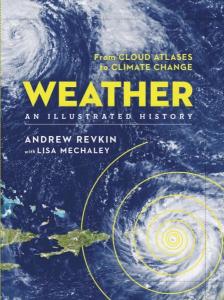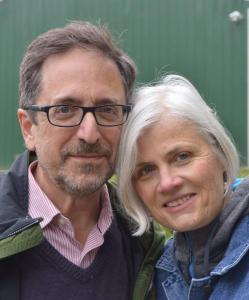Andrew Revkin, Weather: An Illustrated History
For this column, NASW book editor Lynne Lamberg asks NASW authors to tell how they came up with the idea for their book, developed a proposal, found an agent and publisher, funded and conducted research, and put the book together. She also asks what they wish they had known before they began working on their book, what they might do differently the next time, and what tips they can offer aspiring authors. She then edits the A part of that Q&A to produce the author reports you see here.
Publication of NASW members’ reports in Advance Copy does not constitute NASW’s endorsement of their books. NASW welcomes your comments, and hopes this column stimulates productive discussions.
Weather: An Illustrated History, From Cloud Atlases to Climate Change
Andrew Revkin (NASW member) with Lisa Mechaley
Sterling Publishing, May 1, 2018, $24.99
ISBN-10: 1454921404; ISBN-13: 978-1454921400
Revkin reports:
The genesis of this book, my fourth, says much about the merits of maintaining relationships with publishers even when things don’t work out at first. The format–short illustrated items connected by broad themes–shows the value of thinking beyond conventional approaches in conceiving books for readers with online attention spans.
Back in 2012, an editor at Sterling Publishing asked if I’d be interested in writing a new title in a series of illustrated histories of science and disciplines – The Medicine book, The Physics Book, etc.
Did I want to do The Earth Book? I liked the idea but these were big projects–each consisting of 250 milestones, each 300 words. That seemed impossible to fit into my work life along with teaching full time and blogging for The New York Times. I politely declined.
Three years later, the editor called back proposing a book on weather for a more modest line of illustrated histories, each 100 items.
I signed on with a twist. I decided to shape it as a history of humanity’s evolving relationship with weather and climate–from mythology to meteorology, the invention of air conditioning to global warming.
I hadn’t had an agent since 2006 and chose to stay independent, using a lawyer specializing in publishing to negotiate the contract. With my heavy workload, I recruited an experienced environmental educator to help. My co-author, Lisa Mechaley, happens to be my wife, and we’re still happily married.To share work, we created a set of Google documents–a master working list and subsidiary documents for the drafts of each milestone and links to background. We did much of the art search ourselves.
I relied on my dozens of contacts in relevant sciences both for ideas and fact checking, and invited half a dozen to be guest contributors for milestones outside my area of greatest expertise.
If I had chosen to publish independently, I probably would have done the whole book that way–curating insights by others, and with a great online version to reflect that networked approach.
Contact Info:
- Andrew Revkin, 914-441-5556, arevkin@ngs.org,@revkin
- Book website: https://www.sterlingpublishing.com/9781454921400/
NASW members: will your book be published soon? Take advantage of this opportunity for shameless self-promotion. Submit your report for Advance Copy.
Tell your fellow NASW members how you came up with the idea for your book, developed a proposal, found an agent and publisher, funded and conducted research, and put the book together. Include what you wish you had known before you began working on your book, or had done differently.
See https://www.nasw.org/advance-copy-submission-guidelines.
Thinking of writing a book? If you are a NASW member, you may access a list of more than 150 books and online resources to help you craft your book proposal, find an agent and funding sources, negotiate your contract, learn about self-publishing, publicize and market your book, and more at https://www.nasw.org/article/write-book.
Send book info and questions about book publishing to Lynne Lamberg, NASW book editor, llamberg@nasw.org.





